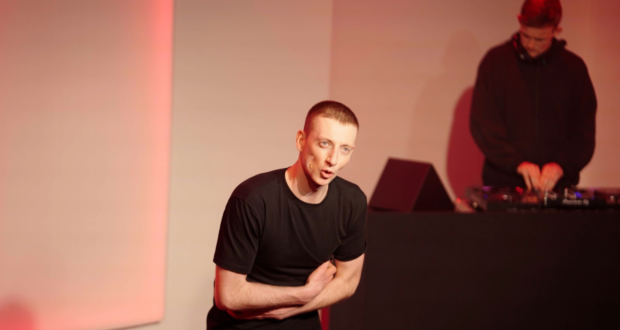A compelling examination of the moment rave culture succumbed to establishment forces.
Summary
Rating
Excellent
Beats, Kieran Hurley‘s engrossing, one-man play examines the period in the mid-1990s at which the rave scene succumbed to conservative forces. First produced in 2012, it has now been revived at the King’s Head Theatre‘s new space in Islington, to considerable success.
Setting the scene, the beat of electronic music emerges from a tent in a field. The arena is smaller than the protagonist Johnno McCreadie (Ned Campbell) imagined, whilst the ground en route is muddy and the air is cold. Magazines have said the rave scene is dying too, but Johnno, a 15-year-old living a humdrum life in central-belt Scotland, is determined to press on and savour it for the first time.
In Westminster, meanwhile, the Tory Government has drawn up the Criminal Justice Bill, its attempt to criminalise the free, outdoor parties that have provoked alarm across middle England and its advocates in the conservative press, giving police licence to clamp down on a euphoric subculture.
Whilst Hurley himself acted in the original production, Ned Campbell directs and performs this time round, filling the role of the narrator and a cast of characters that includes Johnno’s mum Alison, his best mate Spanner – source of drugs and party whereabouts – and the policeman Robert Dunlop.
Robert is the antihero of sorts, a middle-aged copper who is haunted by the voice of his late father, a steelworker and staunch unionist who disapproved of his son joining the force.
Robert recalls their arguments about “collective empathy” and working-class solidarity, ideas that the younger man claims to view as impractical in Thatcherite Britain, though you wonder if he is really convinced.
Certainly he harbours doubts about the need to put on full riot gear to quell the rave that Johnno has sought out, but they go suppressed in the name of the job. Cue an inevitable, ugly confrontation signalling not just a clash between two individuals, but the cultures they represent.
The play works so well partly because Hurley writes robust, pithy dialogue, though Campbell’s superb performance is crucial, too. He switches from energised narrator to wigged-out clubber and melancholic grown-up scarcely without missing a beat (electronic or otherwise). A chair is his only prop, whilst just off stage a DJ mixes a soundtrack featuring choice music from that era, with artists including The Orb, Leftfield and Autechre.
The revival of the play on the 30th anniversary of the Bill is well-timed, with those who opposed it then having insisted that it represented the thin of a wedge when it came to marginalising those outside the mainstream.
Such warnings have been proven prescient. Witness, for example, the recent Public Order Act limiting the scope of peaceful protests, and the Government’s ongoing attempt to criminalise homelessness. As a plummy-voiced radio presenter in Beats asks: “Don’t young people have a right to party? If the Government is allowed to restrict their civil liberties, might not ours be next?”
Writer: Kieran Hurley
Producer, director and performer: Ned Campbell
Co-producer and director: Eloise Poulton
Co-director: Victoria Woodward
Dialect and vocals: Andrea Hazel Lewis
Sound director: Tom Snell
Lighting designer: Alex Lewer
Beats plays at the King’s Head Theatre until April 27.
Further information and bookings can be found here.
 Everything Theatre Reviews, interviews and news for theatre lovers, London and beyond
Everything Theatre Reviews, interviews and news for theatre lovers, London and beyond



